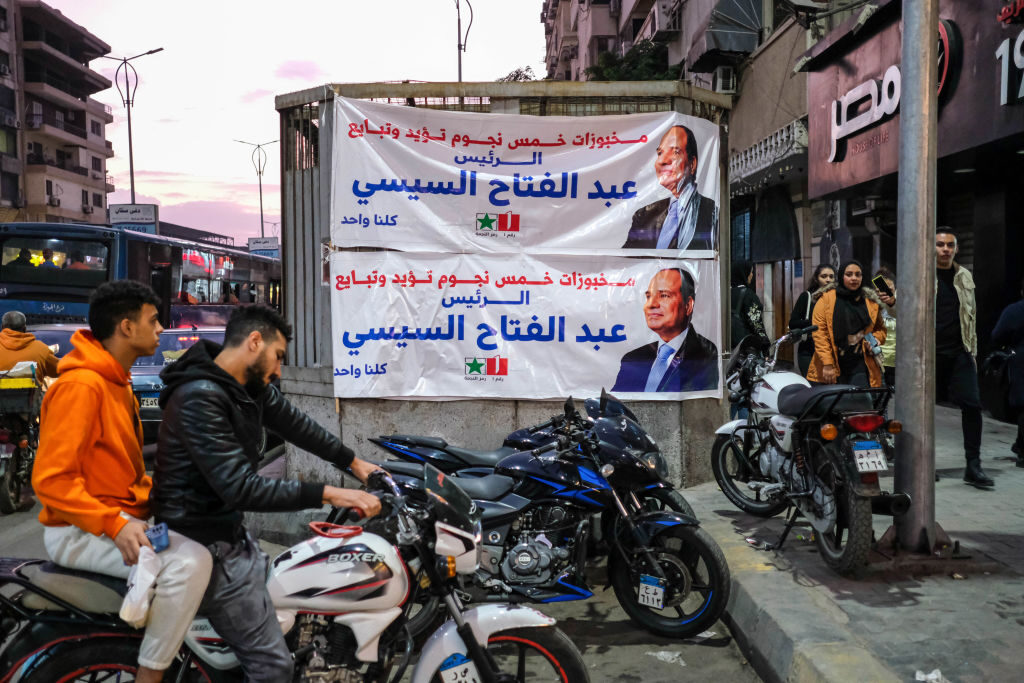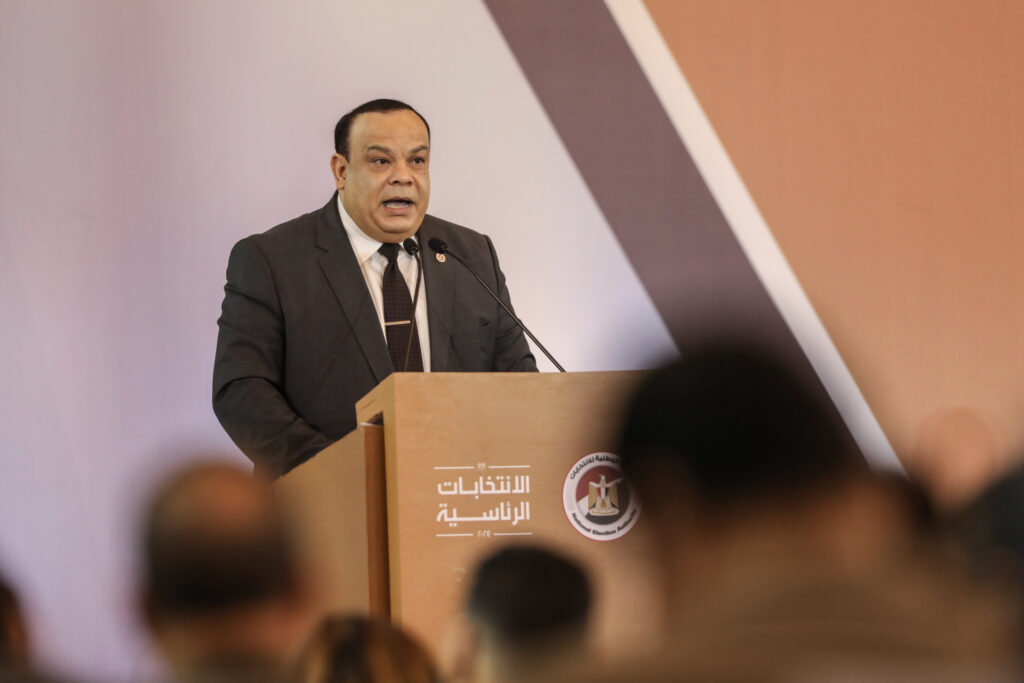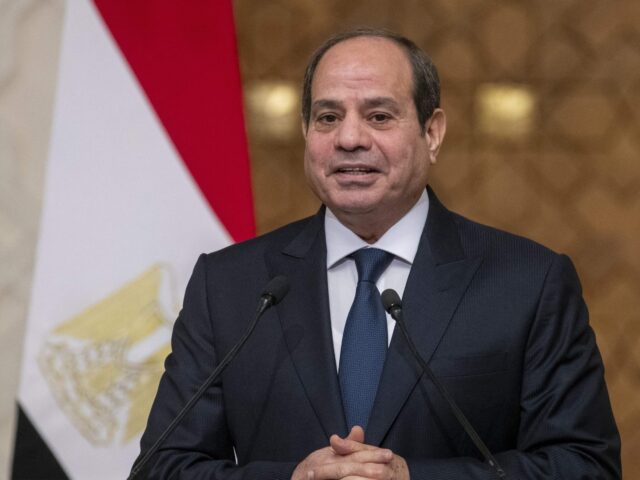Egyptian President Abdel Fattah el-Sisi, who came to power in a 2013 coup and won his first election in 2014, was “re-elected” for a third six-year term on Monday. Election officials said the 66.8-percent turnout was “the highest in the history of Egypt,” and Sisi “won” with 89.6 percent of the vote.
In a televised speech after the results were announced, Sisi claimed turnout was so high because Egyptian voters wanted to “express their rejection to this inhumane war,” meaning Israel’s counter-terrorism operation against Hamas in Gaza.
“This war must come to an end, given the grave threat it poses to Egypt’s national security and the untold suffering it has caused Palestinians,” he said.
Egypt borders Gaza and one of Sisi’s top priorities has been preventing a flood of Palestinian refugees from entering Egypt. Sisi has vacillated between claiming he worries about the cross-border security threat Palestinian refugees would pose to Israel, which would have to strike Egyptian soil to counter that threat, and speculating that Israel is deliberately trying to drive refugees into Egypt to undermine the drive for Palestinian statehood.
Only a week after the Hamas atrocities of October 7, Sisi was already complaining that Israel’s response had “exceeded” its right to self-defense and become “collective punishment” against Palestinian civilians.

Election posters for Abdel-Fattah El-Sisi, Egypt’s president, during the presidential election in Giza, Egypt, on Tuesday, Dec. 12, 2023. (Islam Safwat/Bloomberg via Getty)

The head of Egypt’s National Electoral Council, Hazem Badawy, announces at a press conference that current President Abdel Fattah el-Sisi (not seen) has been re-elected president in Cairo, Egypt on December 18, 2023. (Mohamed Elshahed/Anadolu via Getty Images)
Sisi seized on the Gaza conflict as a way to recover from poll numbers that plummeted as Egypt’s economy collapsed over the past two years. The New York Times (NYT) marveled last week that Egyptians “struggling to cover the basics after nearly two years of record-setting inflation” were somehow finding money to donate to Palestinian causes and inflicting even more economic pain on themselves by boycotting products allegedly linked to Israel.
Sisi also had the advantage of being an authoritarian running for re-election in a stage-managed election against a trio of hopeless palookas. The NYT could not find a single Egyptian voter who knew the names of any of the three opposition candidates. The strongest of Sisi’s three challengers, Hazem Omar of the Republican People’s Party, claimed 4.5 percent of the vote. The opposition might take a very small bit of comfort from recalling that Sisi took over 97 percent of the vote in his last two elections, so he “slid” to 89 percent this time.
The youthful reformist candidate who once seemed to be making headway against Sisi by criticizing his lousy economy and authoritarian abuses, Ahmed al-Tantawy, wound up dropping out of the race because he could not collect enough signatures to appear on the ballot.
Tantaway claimed he was forced out of the race by Sisi because he was too much of a threat. He was charged with “circulating election-related papers without official authorization” after he dropped out in October. Tantaway accused Sisi of deploying violent thugs to prevent his supporters from registering their endorsements.
Many of Sisi’s critics end up in jail, including journalists who write unflattering stories about his government. Reporters Without Borders (RSF) condemned Egypt as “one of the world’s biggest jailers of journalists” in its 2023 press freedom index. Dissidents are held in brutal “pre-trial detention” for months, or even years, before they get a chance in court; some of them do not survive to see their trials. Human rights groups estimate about half of Egypt’s 120,000 inmates are political prisoners.
Analysts glumly predicted the economy is unlikely to improve during Sisi’s third term. Sisi blamed Egypt’s misfortunes on the aftermath of the Wuhan coronavirus pandemic and Russia’s invasion of Ukraine. Those were certainly factors, but a bigger and more intractable problem is that Egyptian state-owned companies have enormous privileges over the private sector, especially companies controlled by the powerful military hierarchy.

Supporters of Abdel-Fattah El-Sisi, Egypt’s president, celebrate in the street following his election victory in Cairo, Egypt, on Monday, Dec. 18, 2023. El-Sisi was re-elected for a third term by a landslide, extending to 2030 his rule over the North African nation that’s mired in its worst economic plight in decades. (Islam Safwat/Bloomberg via Getty)
Sisi’s promises to privatize key firms to attract more foreign investment were only partially kept. Investors are understandably reluctant to pour money into state firms that offer little transparency, refuse to renegotiate contracts, and do not always feel the need to pay their bills. State-owned firms routinely use government power to crush small competitors, seize control of private companies, and keep recalcitrant partners in line by threatening to cut them off from all government contracts.
Bloomberg News on Monday wistfully wondered if Egypt’s 35-percent inflation, devalued currency, and $165 billion foreign currency debt might yet topple Sisi through protests like the “Arab Spring” uprising that toppled the previous military autocrat, Hosni Mubarak – only to replace him with Mohammed Morsi, the Islamist autocrat Sisi overthrew in 2013.
Sisi likes to tout huge projects he stewarded, such as the Suez Canal expansion that was completed years ahead of schedule, but critics say his big projects are mostly expensive boondoggles and the public might be running out of patience with the president’s big spending flexes. The international community might get tired of authorizing billion-dollar bailouts only to get a fraction of the reforms Sisi promised. The “Palestinian question” will not be answered any time soon, but the Gaza war will cool off eventually, leaving Egyptians to once again ponder their economic future.
The Economist noted that Sisi goosed his “historic turnout” by offering boxes of food at polling stations – and “some voters grumbled that the state’s goody bags did not include sugar, the price of which has soared almost 40% since October.”
“It is not a good sign when state bribery cannot keep pace with inflation,” the Economist snarked.
On the other hand, Sisi’s strongman image is appealing to Egyptians worried about their precarious security situation, and the West is prepared to forgive Sisi a lot when the alternative is the implacably hostile Muslim Brotherhood and other Islamist menaces. Sisi’s criticism of the Gaza war might annoy Western and Israeli leaders, but as the Economist pointed out, he has not “cut ties with Israel” or allowed “spontaneous shows of pro-Palestine activism.”

COMMENTS
Please let us know if you're having issues with commenting.